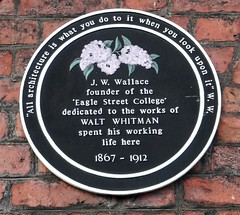Walt Whitman
Commemorated on 2 plaques
"All architecture is what you do to it when you look upon it' W.W. J.W. Wallace founder of the 'Eagle Street College' dedicated to the works of Walt Whitman spent his working life here 1867 - 1912
Silverwell Street, Bolton, United Kingdom where they was
Kentucky Historical Marker #1681
Louisville's Steamboat Era. River navigation in 18th century was by flatboat and keelboat. First steamboat, NEW ORLEANS, arrived in Louisville in autumn of 1811. City soon became steamboat center with six lines operating here. Hundreds of these boats were built in area. Wharf teemed with traffic through Civil War. Eight U.S. presidents arrived on this wharf or "levee." (Reverse) Visitors at Louisville Wharf James Monroe - June 1819 Andrew Jackson - June 1819 Alexis de Tocqueville - Dec. 1831 Washington Irving - Sept. 1832 Abraham Lincoln - Sept. 1841 Charles Dickens - Apr. 1842 Walt Whitman - Feb. 1848 Ralph Waldo Emerson - June 1850 Oliver W. Holmes - Sept. 1855 Herman Melville - Jan.1858
At the Wharf, 4th St., Louisville, KY, United States where they visited (1841)



